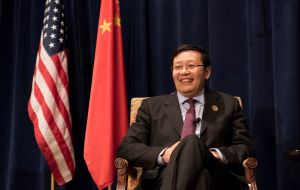MercoPress. South Atlantic News Agency
Top Beijing official warns of risks facing China's “messy” financial system
 Speaking at a forum in Beijing Lou Jiwei, now chairman of the National Social Security Fund Council, described the state of China’s financial sector as “messy”.
Speaking at a forum in Beijing Lou Jiwei, now chairman of the National Social Security Fund Council, described the state of China’s financial sector as “messy”.  The country’s financial system had become “severely distorted”, he said, adding that the “likelihood of China generating systematic financial risks is pretty big”.
The country’s financial system had become “severely distorted”, he said, adding that the “likelihood of China generating systematic financial risks is pretty big”.  Lou Jiwei, 68, who helped shape China’s economic reforms that began in the 1980s and served as finance minister from 2013-16, has been an outspoken figure
Lou Jiwei, 68, who helped shape China’s economic reforms that began in the 1980s and served as finance minister from 2013-16, has been an outspoken figure The level of risk facing China’s financial system could be higher than was seen in the United States before the global crash, according to a former Chinese finance minister. Speaking at a forum in Beijing over the weekend, Lou Jiwei, now chairman of the National Social Security Fund Council, also described the state of China’s financial sector as “messy”.
“Compared to the US financial market 10 years ago, [when] the risk and return on derivatives … were defined and the products were registered [with regulators] … China’s [financial market] is more messy,” he said.
“The real risks and returns can only be determined after looking into the underlying assets.”
A transcript of Lou’s speech was published by Chinese business magazine Caixin, while his comments were also widely reported by other Chinese media, including Economic Information Daily.
The 68-year-old, who helped to shape China’s economic reforms that began in the 1980s and served as finance minister from 2013-16, has been an outspoken figure since leaving the main policymaking arena and is generally regarded as a reformist.
The country’s financial system had become “severely distorted”, he said, adding that the “likelihood of China generating systematic financial risks is pretty big”. The distortion was exemplified by the high cost of financing in China despite the loose monetary environment, Lou said.
“China’s ratio of M2 [a broad measure of money supply] to gross domestic product has surpassed 200%, which is more than twice that of the United States, yet the average Shanghai interbank offered rate is 4.09%, far higher than the 1.1 per cent in the US.”
According to official figures, the M2 money supply at the end of December was 167.68 trillion yuan (US$26.5 trillion), or 203% of China’s nominal GDP in 2017.
Lou said also that the slowdown in growth seen in recent years suggested that the effect of monetary expansion on the economy was weakening.
“Further stimulus will worsen monetization and encourage financial speculation, but have only a limited effect in driving growth,” he said.
Meanwhile, the “dazzling” array of financing channels and organizations – from Ponzi schemes to peer-to-peer lending platforms, insurance products and capital pools – had resulted in a complex fundraising environment, Lou said, adding that unique to China were the “many financial or quasi-financial institutions that try their best to bypass financial regulation”.
“The overlapping of derivatives results in much higher fundraising costs, worsens the operation of Chinese businesses and disguises the risks,” he said. Lou added that the country’s regional debt burden would limit any room the government had for fiscal or monetary stimulus in the future.
“The local government debt risk has shown up after years of heavy infrastructure construction and it is inappropriate to increase debt in these areas,” he said.
Chinese President Xi Jinping has made tackling financial risk a priority over the next three years, vowing to clamp down on irregularities. In July, the government set up the Financial Stability and Development Commission to coordinate such efforts.
Regulators have already begun cracking the whip. Since the start of the year, the China Banking Regulatory Commission has fined dozens of financial institutions a combined 2 billion yuan (US$315.7 million), or about two-thirds of the total value of fines issued in the whole of 2017.
Meanwhile, the People’s Bank of China was considering how to accommodate internet finance and other shadow banking businesses into its macro-prudential framework, deputy governor Yi Gang said in an article published on Monday.




Top Comments
Disclaimer & comment rulesCommenting for this story is now closed.
If you have a Facebook account, become a fan and comment on our Facebook Page!